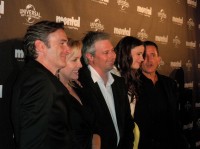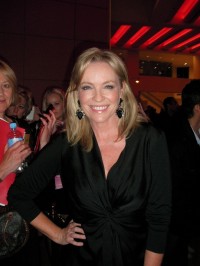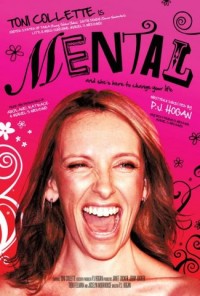Reviewed by Joelene Pynnonen
Finding a more proudly Australian film than Mental in 2012 will be a challenge. Writer and director, PJ Hogan, of Muriel’s Wedding fame has once again delivered with his darkly comic new film. Mental is what he likes to think of as a ‘whole-meal comedy’ rather than one of the all too common ‘dessert comedies’ floating around Hollywood at the moment. Had I not seen this irreverent film before Hogan spoke to us about it, I probably would not have understood the sentiments he was expressing. The description is apt though, Mental is a message told through the medium of comedy rather than a comedy existing for entertainment value alone.
The Moochmore household is fraying; each of the seven members holding on to sanity and each other by a tenuous thread. Barry Moochmore has not had dinner with his family since his eldest daughter, Coral, tried to kill herself. His wife, Shirley, is struggling with the responsibility of looking after their five daughters and, wishing that her life was happier, she finds comfort in The Sound of Music. Living with a mother who thinks she’s in a musical and a father who can’t tell his children apart, the five Moochmore girls self-diagnose mental illnesses because ‘if they’re not mental then they’re just unpopular’.
When Shirley suffers a breakdown that even Barry cannot ignore, he checks her into a mental institution. Unable to cope with the children he barely knows, he comes across Shaz, a hitchhiker who agrees to nanny the girls.
Every aspect of Mental pulls together near perfectly to make it a comedy with emotional and spiritual integrity. While the laughs come thick and fast, the themes of sanity, insanity and family add depth. As entertaining as Mental is, it opens up the ideas of mental health, leaving audiences with a wealth of subjects to consider and discuss. It doesn’t confine itself to the light fun bits of life either, instead balancing precariously on the fine line between tragedy and comedy.
fast, the themes of sanity, insanity and family add depth. As entertaining as Mental is, it opens up the ideas of mental health, leaving audiences with a wealth of subjects to consider and discuss. It doesn’t confine itself to the light fun bits of life either, instead balancing precariously on the fine line between tragedy and comedy.
Though comedy serves this film so strongly in many ways, it also weakens some of the moments that could have delivered much more of an emotional punch. Looking at something as frightening and lonely as mental illness with humour succeeds in pushing an issue that is all too often disregarded into the spotlight. Through most of the film and with most of the characters it works. Some scenes, however, do suffer because of previous humorous treatment. Because Malorie O’Neill’s character, Michelle’s, schizophrenia is regarded in a humorous way through the film; it becomes difficult to reconcile with the stark reality of her illness when it surfaces.
 The cast work brilliantly together. They play genuinely flawed, sympathetic and believable characters, all of whom are very different. Despite the diversity, the chemistry between the actors is perfect. Toni Collette’s performance is especially good. As always she raises the bar for all everyone else, and they rise to the challenge magnificently. Four of the five girls playing the Moochmore children are new to acting but, from their performances, which four is anyone’s guess.
The cast work brilliantly together. They play genuinely flawed, sympathetic and believable characters, all of whom are very different. Despite the diversity, the chemistry between the actors is perfect. Toni Collette’s performance is especially good. As always she raises the bar for all everyone else, and they rise to the challenge magnificently. Four of the five girls playing the Moochmore children are new to acting but, from their performances, which four is anyone’s guess.
There is a strongly Australian feel to Mental. In many ways it could be considered a companion piece to Muriel’s Wedding. Both revolve around music, there is the same sense of small-minded, small-town community and no shortage of whacky characters with their own goals and insecurities. While Muriel’s Wedding suited the strong friendship focus of the mid-nineties however, Mental is thoroughly modern. The connection between family members is stronger and, while there is still emphasis on the importance of self-confidence, the characters have more support whilst finding themselves.
This is a fresh, fun take on a serious issue that affects far too many people. It unapologetically broaches subjects that are still taboo, utilising humour to keep it from getting too heavy. It’s for everyone who has never quite fitted in. And for everyone who has ever been embarrassed by their family; or worse, been the embarrassment, this is the movie for you.



































